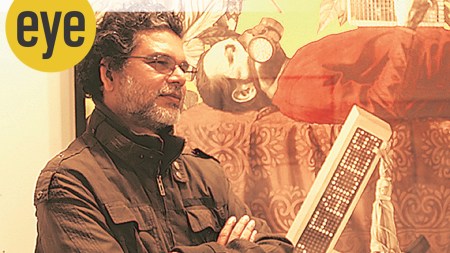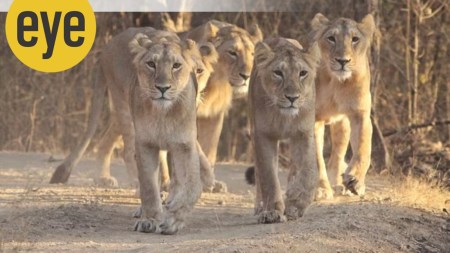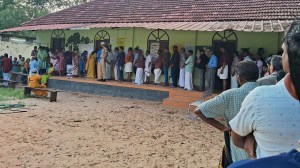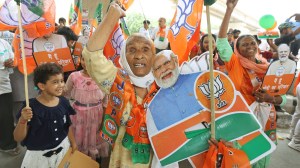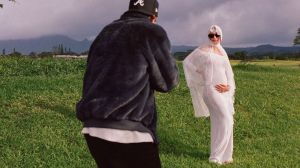- India
- International
Behind cannibal stereotype: Why Joe Biden’s comments offended Papua New Guinea
The people of New Guinea have long tried to shed the cannibal label. While there have been documented cases of cannibalism among tribes on the island, the use of the stereotype has as much to do with European ideas on race and civilisation.
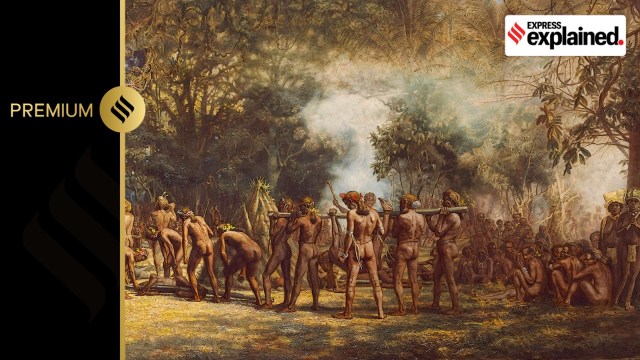 A cannibal feast on Tanna, Vanuatu, c. 1885–1889, as painted by Charles E. Gordon Frazer. Depictions such as these were used to emphasise on the savagery and primitiveness of the natives, and thus justify the actions of European colonisers. (Wikimedia Commons)
A cannibal feast on Tanna, Vanuatu, c. 1885–1889, as painted by Charles E. Gordon Frazer. Depictions such as these were used to emphasise on the savagery and primitiveness of the natives, and thus justify the actions of European colonisers. (Wikimedia Commons)Papua New Guinea Prime Minister James Marape, last week, criticised United States President Joe Biden for implying that his uncle was eaten by cannibals in New Guinea during World War II.
Biden, during a campaign event at Pittsburgh on April 17, had said that after his uncle’s plane was shot down in New Guinea, “they never found the body because there used to be, there were a lot of cannibals, for real, in that part of New Guinea.”
In response, Marape said: “President Biden’s remarks may have been a slip of the tongue; however, my country does not deserve to be labelled as such [as cannibals].”
The people of New Guinea have long tried to shed the cannibal label. While there have been documented cases of cannibalism among tribes on the island, the use of the stereotype has as much to do with European ideas on race and civilisation.
Eating ‘witches’, not humans
The Korowai tribe of New Guinea (they live in the Indonesian province of Papua on the western side of the island) number between 2,000 and 4,000. Anthropologist Rupert Stasch wrote that “their spectacular treehouses, their limited possession of factory-made commodities such as cotton clothing, and their practice of cannibalism” make them “a perfect fit with Westerners’ stereotypes of ‘primitive’ humanity” (Society of Others: Kinship and Mourning in a West Papuan Place, 2009).

Although some anthropologists say the practice has been discontinued, the Korowai gained global notoriety as cannibals. But they themselves do not identify as such.
“The Korowai have no knowledge of the deadly germs that infest their jungles, and so believe that mysterious deaths must be caused by khakhua, or witches who take on the form of men,” a 2006 Smithsonian Magazine article said. When a member of the tribe dies, his or her male relatives kill the khakhua responsible (the dying person names him). And then they eat him. As a Korawai man told the Smithsonian Magazine: “We don’t eat humans, we only eat khakhua.”
Cannibalism as acts of love and grief
Cannibalism in New Guinea has also been documented among the Fore (pronounced FOR-ay) people who live in the highlands of Papua New Guinea. This tribe of approximately 20,000 individuals (today) consumed human flesh as part of mortuary rituals till about the 1960s.
For the Fore, this was an act of love and grief. “If the body was buried it was eaten by worms; if it was placed on a platform it was eaten by maggots; the Fore believed it was much better that the body was eaten by people who loved the deceased than by worms and insects,” researchers Jerome Whitfield, Wandagi Pako, John Collinge, and Michael Alpers wrote in their paper ‘Mortuary rites of the South Fore and kuru’ (2008).
The Fore stopped consuming human flesh in the 1960s after it was discovered that it was this practice that was leading to the spread of a deadly disease — kuru (literally “shivering” or “trembling”), later identified as a form of transmissible spongiform encephalopathy — that was annually killing as many as 200 Fore in the mid-20th century. The incidence of kuru has now declined, and no Fore has succumbed to the illness since 2010.
The cannibal stereotype in New Guinea
In both the above cases, consumption of human flesh was a part of social custom, which helped the tribes make sense of the inexplicable, or process difficult emotions. New Guinea’s famous cannibal tribes did not eat just anybody, as Biden’s remarks appeared to imply. They were not “savages” — stereotype that has historically followed cannibals.
“At best, these ‘savages’ were pegged as souls to be saved… But far worse occurred throughout history, as those accused of consuming other humans, for any reason, were brutalised, enslaved, and murdered,” author Bill Schutt wrote in Cannibalism: A Perfectly Natural History (2017).
“During the last years of the 15th century… millions of indigenous people living in the Caribbean and Mexico were summarily reclassified as cannibals for reasons that had little to do with people-eating. Instead, it paved the way for them to be robbed, beaten, conquered, and slain, all at the whim of their new Spanish masters,” he wrote.
Biden’s remarks — and Papua New Guinea’s reaction to them — must be seen in this context, where the cannibal stereotype has been used to justify the excesses of European colonialism.
What explains cannibalism
In Darwinian terms, it is fairly simple to explain the cannibal taboo. Eating one’s own is looked down upon as it impacts the health of the species. If, as Darwin postulated, all species have a fundamental imperative towards survival and propagation, the practice of cannibalism is directly antithetical to this.
However, there is plenty of evidence of cannibalism across the natural world, from single-celled organisms, to dinosaurs, to polar bears, to humans.
Schutt argued that the incidence and frequency of cannibalism can be explained among various species — and different human communities — based on their local environmental conditions. “Cannibalism serves a variety of functions, depending on the cannibal. There are even examples in which an individual being cannibalised receives a benefit,” he wrote.
Palaeoanthripologist Carole A Travis-Henikoff explained in her book Dinner with a Cannibal (2008): “Starvation brings on ‘survival’ cannibalism, while the ingestion of dead relatives is known as ‘endocannibalism’ or “funerary” cannibalism [like in the case of the Fore, an act of mourning]. ‘Exocannibalism’ refers to the eating of one’s enemies [like the Korowai, also known to address skewed sex ratios], whereas ‘religious’ cannibalism relates to the actual or simulated partaking of human flesh as part of a religious rite.”
More Explained
EXPRESS OPINION
May 12: Latest News
- 01
- 02
- 03
- 04
- 05






